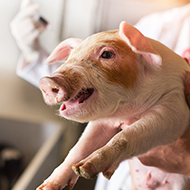
Repeated needle usage results in increased administering force.
A study from the Royal Veterinary College (RVC) has found that repeated needle use in piglets increases the required puncture force, which could lead to piglets experiencing increased pain.
Published in the journal Veterinary Sciences, the research provides data to support the recommendations of changing needles between litters (12 piglets), which is deemed crucial for protecting their welfare.
As the study explains, the majority of piglets born indoors in the UK require an iron injection in the first few days following birth to prevent anaemia, and the reuse of needles is a common practice in livestock farming.
A survey was sent out to a sample of UK pig farmers, which found that from 31 respondents, 81 per cent of farms reported needle reuse, with only 39 per cent changing the needle between litters, or earlier if damaged, and 23 per cent changing the needle when it felt blunt or damaged, after each session of injections, or when changing the bottle of iron solution.
Led by undergraduate veterinary student Kathryn Owen, the research team used a piglet cadaver to examine the force required to puncture the skin, mimicking the reuse of needles. Electron microscopy imaging was then used to view the needles to assess the damage caused over repeat usage.
The researchers found that the puncture forces increased after 36 uses, and that the electron microscopy images showed visible damage after 12 uses.
Kathryn explained: “Needle reuse increases the force required to puncture the skin, this indicates blunting which could cause pain and distress of piglets.
“Electron microscopy shows that after 12 injections the needle tip is visibly blunted.”



 The Animal and Plant Health Agency (APHA) has updated its online reporting service for dead wild birds.
The Animal and Plant Health Agency (APHA) has updated its online reporting service for dead wild birds.